Case Study: Mental Health Act and Schizophrenia in UMH207
VerifiedAdded on 2023/06/10
|9
|2655
|372
Case Study
AI Summary
This case study report focuses on a 32-year-old male, Jason, diagnosed with schizophrenia at 19. The report examines the application of the Mental Health Act, addressing legal and ethical issues concerning patient rights, and comparing the concepts of mental health, mental illness, and mental disorder. It identifies the main symptoms of schizophrenia, including auditory hallucinations, and discusses how a registered nurse can advocate for the patient's rights. The report also determines clinically indicated medications, like antipsychotics, and provides rationales for their use. It evaluates and explains techniques for developing trust and rapport, as well as explaining the need for depot antipsychotic medication. Finally, it identifies safety techniques for nurses in the given mental state of the patient. The report highlights the importance of therapeutic relationships and effective communication in providing patient-centered care.

Case study
Paraphrase This Document
Need a fresh take? Get an instant paraphrase of this document with our AI Paraphraser
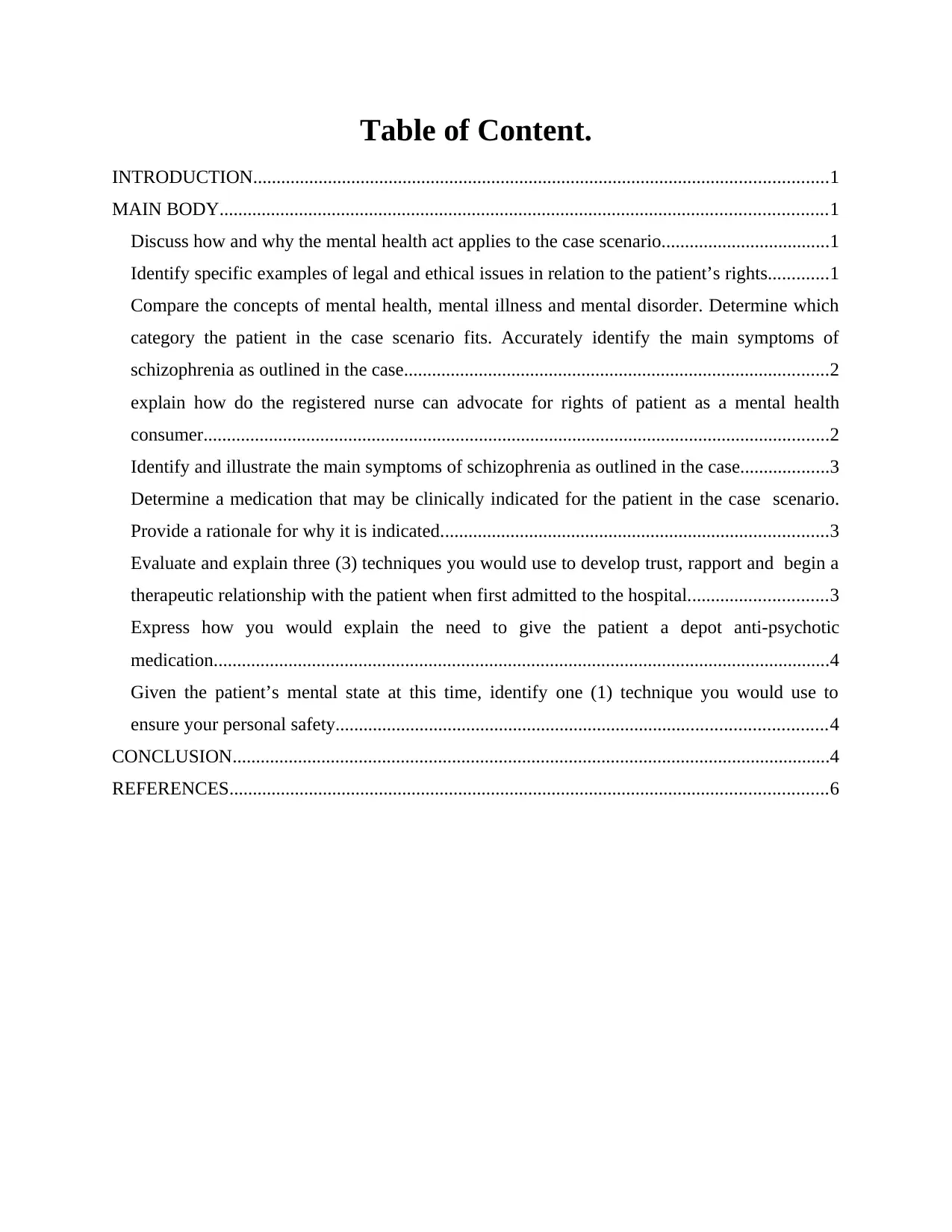
Table of Content.
INTRODUCTION...........................................................................................................................1
MAIN BODY..................................................................................................................................1
Discuss how and why the mental health act applies to the case scenario....................................1
Identify specific examples of legal and ethical issues in relation to the patient’s rights.............1
Compare the concepts of mental health, mental illness and mental disorder. Determine which
category the patient in the case scenario fits. Accurately identify the main symptoms of
schizophrenia as outlined in the case...........................................................................................2
explain how do the registered nurse can advocate for rights of patient as a mental health
consumer......................................................................................................................................2
Identify and illustrate the main symptoms of schizophrenia as outlined in the case...................3
Determine a medication that may be clinically indicated for the patient in the case scenario.
Provide a rationale for why it is indicated...................................................................................3
Evaluate and explain three (3) techniques you would use to develop trust, rapport and begin a
therapeutic relationship with the patient when first admitted to the hospital..............................3
Express how you would explain the need to give the patient a depot anti-psychotic
medication....................................................................................................................................4
Given the patient’s mental state at this time, identify one (1) technique you would use to
ensure your personal safety.........................................................................................................4
CONCLUSION................................................................................................................................4
REFERENCES................................................................................................................................6
INTRODUCTION...........................................................................................................................1
MAIN BODY..................................................................................................................................1
Discuss how and why the mental health act applies to the case scenario....................................1
Identify specific examples of legal and ethical issues in relation to the patient’s rights.............1
Compare the concepts of mental health, mental illness and mental disorder. Determine which
category the patient in the case scenario fits. Accurately identify the main symptoms of
schizophrenia as outlined in the case...........................................................................................2
explain how do the registered nurse can advocate for rights of patient as a mental health
consumer......................................................................................................................................2
Identify and illustrate the main symptoms of schizophrenia as outlined in the case...................3
Determine a medication that may be clinically indicated for the patient in the case scenario.
Provide a rationale for why it is indicated...................................................................................3
Evaluate and explain three (3) techniques you would use to develop trust, rapport and begin a
therapeutic relationship with the patient when first admitted to the hospital..............................3
Express how you would explain the need to give the patient a depot anti-psychotic
medication....................................................................................................................................4
Given the patient’s mental state at this time, identify one (1) technique you would use to
ensure your personal safety.........................................................................................................4
CONCLUSION................................................................................................................................4
REFERENCES................................................................................................................................6
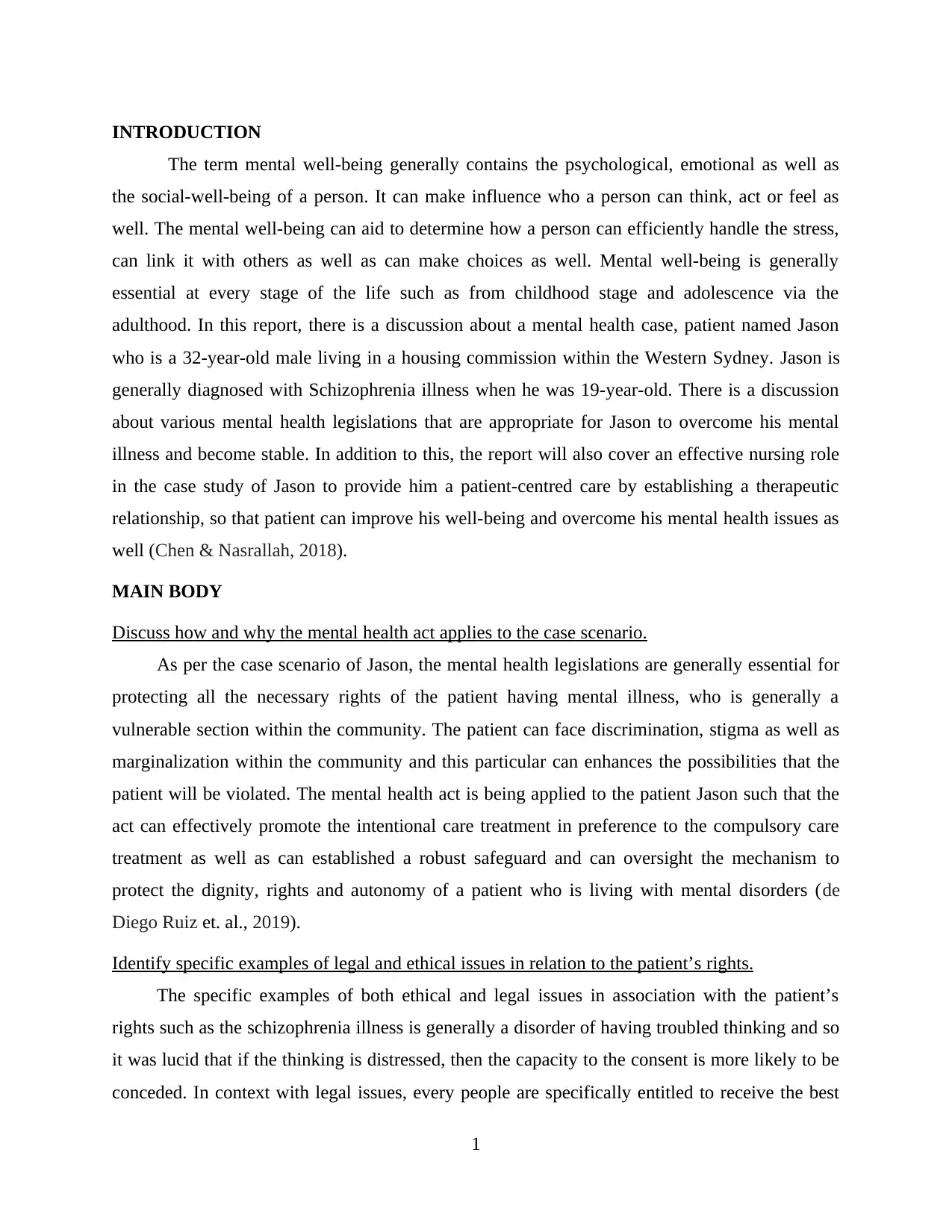
INTRODUCTION
The term mental well-being generally contains the psychological, emotional as well as
the social-well-being of a person. It can make influence who a person can think, act or feel as
well. The mental well-being can aid to determine how a person can efficiently handle the stress,
can link it with others as well as can make choices as well. Mental well-being is generally
essential at every stage of the life such as from childhood stage and adolescence via the
adulthood. In this report, there is a discussion about a mental health case, patient named Jason
who is a 32-year-old male living in a housing commission within the Western Sydney. Jason is
generally diagnosed with Schizophrenia illness when he was 19-year-old. There is a discussion
about various mental health legislations that are appropriate for Jason to overcome his mental
illness and become stable. In addition to this, the report will also cover an effective nursing role
in the case study of Jason to provide him a patient-centred care by establishing a therapeutic
relationship, so that patient can improve his well-being and overcome his mental health issues as
well (Chen & Nasrallah, 2018).
MAIN BODY
Discuss how and why the mental health act applies to the case scenario.
As per the case scenario of Jason, the mental health legislations are generally essential for
protecting all the necessary rights of the patient having mental illness, who is generally a
vulnerable section within the community. The patient can face discrimination, stigma as well as
marginalization within the community and this particular can enhances the possibilities that the
patient will be violated. The mental health act is being applied to the patient Jason such that the
act can effectively promote the intentional care treatment in preference to the compulsory care
treatment as well as can established a robust safeguard and can oversight the mechanism to
protect the dignity, rights and autonomy of a patient who is living with mental disorders (de
Diego Ruiz et. al., 2019).
Identify specific examples of legal and ethical issues in relation to the patient’s rights.
The specific examples of both ethical and legal issues in association with the patient’s
rights such as the schizophrenia illness is generally a disorder of having troubled thinking and so
it was lucid that if the thinking is distressed, then the capacity to the consent is more likely to be
conceded. In context with legal issues, every people are specifically entitled to receive the best
1
The term mental well-being generally contains the psychological, emotional as well as
the social-well-being of a person. It can make influence who a person can think, act or feel as
well. The mental well-being can aid to determine how a person can efficiently handle the stress,
can link it with others as well as can make choices as well. Mental well-being is generally
essential at every stage of the life such as from childhood stage and adolescence via the
adulthood. In this report, there is a discussion about a mental health case, patient named Jason
who is a 32-year-old male living in a housing commission within the Western Sydney. Jason is
generally diagnosed with Schizophrenia illness when he was 19-year-old. There is a discussion
about various mental health legislations that are appropriate for Jason to overcome his mental
illness and become stable. In addition to this, the report will also cover an effective nursing role
in the case study of Jason to provide him a patient-centred care by establishing a therapeutic
relationship, so that patient can improve his well-being and overcome his mental health issues as
well (Chen & Nasrallah, 2018).
MAIN BODY
Discuss how and why the mental health act applies to the case scenario.
As per the case scenario of Jason, the mental health legislations are generally essential for
protecting all the necessary rights of the patient having mental illness, who is generally a
vulnerable section within the community. The patient can face discrimination, stigma as well as
marginalization within the community and this particular can enhances the possibilities that the
patient will be violated. The mental health act is being applied to the patient Jason such that the
act can effectively promote the intentional care treatment in preference to the compulsory care
treatment as well as can established a robust safeguard and can oversight the mechanism to
protect the dignity, rights and autonomy of a patient who is living with mental disorders (de
Diego Ruiz et. al., 2019).
Identify specific examples of legal and ethical issues in relation to the patient’s rights.
The specific examples of both ethical and legal issues in association with the patient’s
rights such as the schizophrenia illness is generally a disorder of having troubled thinking and so
it was lucid that if the thinking is distressed, then the capacity to the consent is more likely to be
conceded. In context with legal issues, every people are specifically entitled to receive the best
1
⊘ This is a preview!⊘
Do you want full access?
Subscribe today to unlock all pages.

Trusted by 1+ million students worldwide
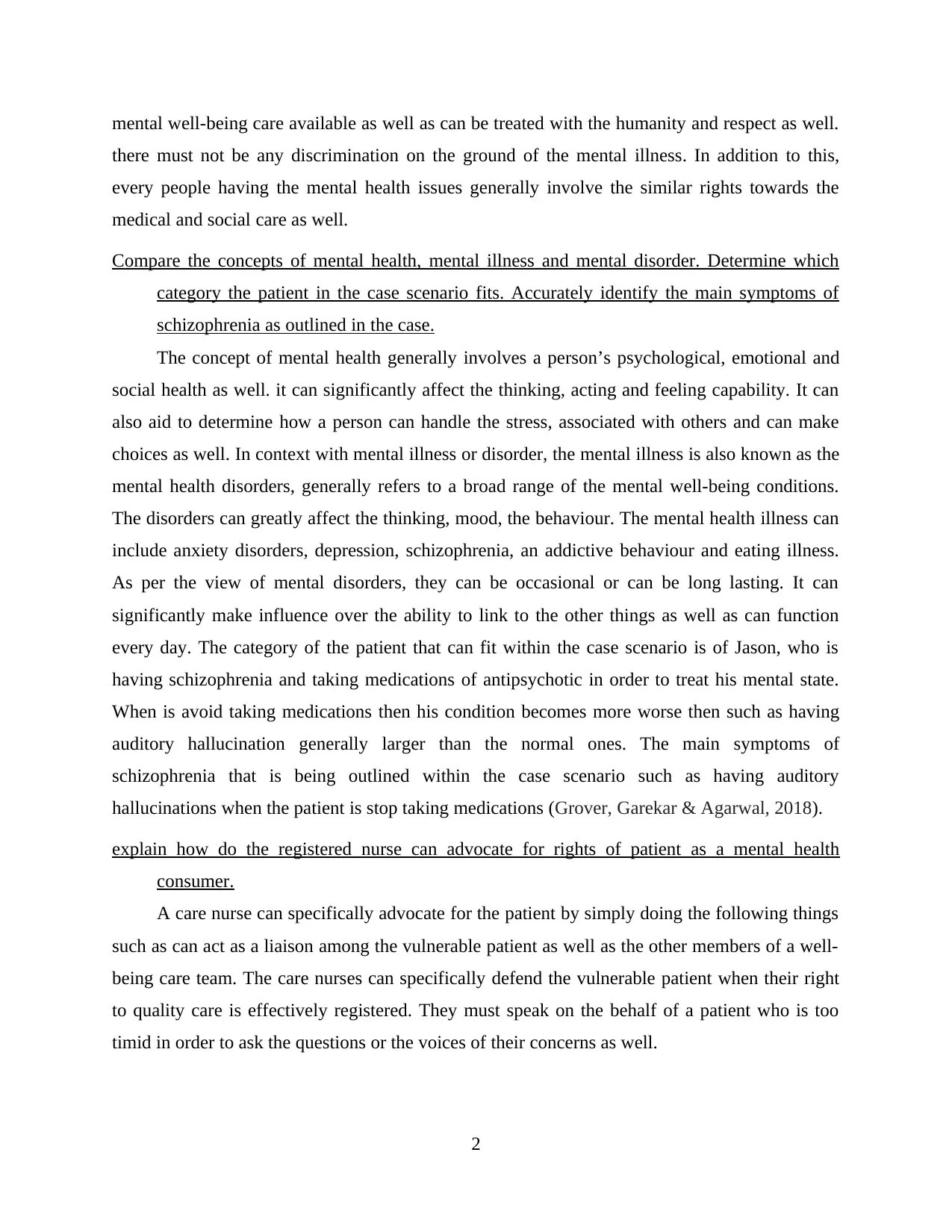
mental well-being care available as well as can be treated with the humanity and respect as well.
there must not be any discrimination on the ground of the mental illness. In addition to this,
every people having the mental health issues generally involve the similar rights towards the
medical and social care as well.
Compare the concepts of mental health, mental illness and mental disorder. Determine which
category the patient in the case scenario fits. Accurately identify the main symptoms of
schizophrenia as outlined in the case.
The concept of mental health generally involves a person’s psychological, emotional and
social health as well. it can significantly affect the thinking, acting and feeling capability. It can
also aid to determine how a person can handle the stress, associated with others and can make
choices as well. In context with mental illness or disorder, the mental illness is also known as the
mental health disorders, generally refers to a broad range of the mental well-being conditions.
The disorders can greatly affect the thinking, mood, the behaviour. The mental health illness can
include anxiety disorders, depression, schizophrenia, an addictive behaviour and eating illness.
As per the view of mental disorders, they can be occasional or can be long lasting. It can
significantly make influence over the ability to link to the other things as well as can function
every day. The category of the patient that can fit within the case scenario is of Jason, who is
having schizophrenia and taking medications of antipsychotic in order to treat his mental state.
When is avoid taking medications then his condition becomes more worse then such as having
auditory hallucination generally larger than the normal ones. The main symptoms of
schizophrenia that is being outlined within the case scenario such as having auditory
hallucinations when the patient is stop taking medications (Grover, Garekar & Agarwal, 2018).
explain how do the registered nurse can advocate for rights of patient as a mental health
consumer.
A care nurse can specifically advocate for the patient by simply doing the following things
such as can act as a liaison among the vulnerable patient as well as the other members of a well-
being care team. The care nurses can specifically defend the vulnerable patient when their right
to quality care is effectively registered. They must speak on the behalf of a patient who is too
timid in order to ask the questions or the voices of their concerns as well.
2
there must not be any discrimination on the ground of the mental illness. In addition to this,
every people having the mental health issues generally involve the similar rights towards the
medical and social care as well.
Compare the concepts of mental health, mental illness and mental disorder. Determine which
category the patient in the case scenario fits. Accurately identify the main symptoms of
schizophrenia as outlined in the case.
The concept of mental health generally involves a person’s psychological, emotional and
social health as well. it can significantly affect the thinking, acting and feeling capability. It can
also aid to determine how a person can handle the stress, associated with others and can make
choices as well. In context with mental illness or disorder, the mental illness is also known as the
mental health disorders, generally refers to a broad range of the mental well-being conditions.
The disorders can greatly affect the thinking, mood, the behaviour. The mental health illness can
include anxiety disorders, depression, schizophrenia, an addictive behaviour and eating illness.
As per the view of mental disorders, they can be occasional or can be long lasting. It can
significantly make influence over the ability to link to the other things as well as can function
every day. The category of the patient that can fit within the case scenario is of Jason, who is
having schizophrenia and taking medications of antipsychotic in order to treat his mental state.
When is avoid taking medications then his condition becomes more worse then such as having
auditory hallucination generally larger than the normal ones. The main symptoms of
schizophrenia that is being outlined within the case scenario such as having auditory
hallucinations when the patient is stop taking medications (Grover, Garekar & Agarwal, 2018).
explain how do the registered nurse can advocate for rights of patient as a mental health
consumer.
A care nurse can specifically advocate for the patient by simply doing the following things
such as can act as a liaison among the vulnerable patient as well as the other members of a well-
being care team. The care nurses can specifically defend the vulnerable patient when their right
to quality care is effectively registered. They must speak on the behalf of a patient who is too
timid in order to ask the questions or the voices of their concerns as well.
2
Paraphrase This Document
Need a fresh take? Get an instant paraphrase of this document with our AI Paraphraser
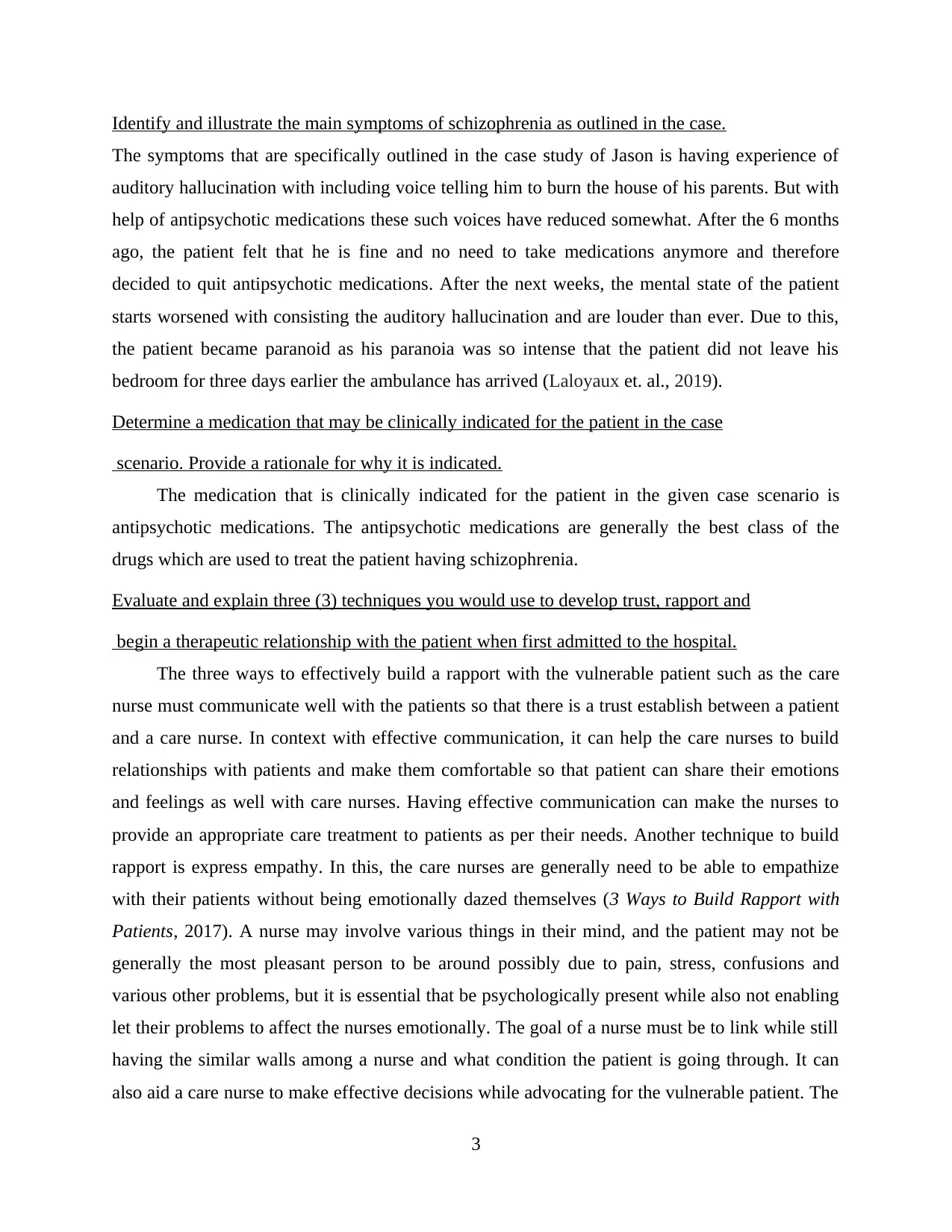
Identify and illustrate the main symptoms of schizophrenia as outlined in the case.
The symptoms that are specifically outlined in the case study of Jason is having experience of
auditory hallucination with including voice telling him to burn the house of his parents. But with
help of antipsychotic medications these such voices have reduced somewhat. After the 6 months
ago, the patient felt that he is fine and no need to take medications anymore and therefore
decided to quit antipsychotic medications. After the next weeks, the mental state of the patient
starts worsened with consisting the auditory hallucination and are louder than ever. Due to this,
the patient became paranoid as his paranoia was so intense that the patient did not leave his
bedroom for three days earlier the ambulance has arrived (Laloyaux et. al., 2019).
Determine a medication that may be clinically indicated for the patient in the case
scenario. Provide a rationale for why it is indicated.
The medication that is clinically indicated for the patient in the given case scenario is
antipsychotic medications. The antipsychotic medications are generally the best class of the
drugs which are used to treat the patient having schizophrenia.
Evaluate and explain three (3) techniques you would use to develop trust, rapport and
begin a therapeutic relationship with the patient when first admitted to the hospital.
The three ways to effectively build a rapport with the vulnerable patient such as the care
nurse must communicate well with the patients so that there is a trust establish between a patient
and a care nurse. In context with effective communication, it can help the care nurses to build
relationships with patients and make them comfortable so that patient can share their emotions
and feelings as well with care nurses. Having effective communication can make the nurses to
provide an appropriate care treatment to patients as per their needs. Another technique to build
rapport is express empathy. In this, the care nurses are generally need to be able to empathize
with their patients without being emotionally dazed themselves (3 Ways to Build Rapport with
Patients, 2017). A nurse may involve various things in their mind, and the patient may not be
generally the most pleasant person to be around possibly due to pain, stress, confusions and
various other problems, but it is essential that be psychologically present while also not enabling
let their problems to affect the nurses emotionally. The goal of a nurse must be to link while still
having the similar walls among a nurse and what condition the patient is going through. It can
also aid a care nurse to make effective decisions while advocating for the vulnerable patient. The
3
The symptoms that are specifically outlined in the case study of Jason is having experience of
auditory hallucination with including voice telling him to burn the house of his parents. But with
help of antipsychotic medications these such voices have reduced somewhat. After the 6 months
ago, the patient felt that he is fine and no need to take medications anymore and therefore
decided to quit antipsychotic medications. After the next weeks, the mental state of the patient
starts worsened with consisting the auditory hallucination and are louder than ever. Due to this,
the patient became paranoid as his paranoia was so intense that the patient did not leave his
bedroom for three days earlier the ambulance has arrived (Laloyaux et. al., 2019).
Determine a medication that may be clinically indicated for the patient in the case
scenario. Provide a rationale for why it is indicated.
The medication that is clinically indicated for the patient in the given case scenario is
antipsychotic medications. The antipsychotic medications are generally the best class of the
drugs which are used to treat the patient having schizophrenia.
Evaluate and explain three (3) techniques you would use to develop trust, rapport and
begin a therapeutic relationship with the patient when first admitted to the hospital.
The three ways to effectively build a rapport with the vulnerable patient such as the care
nurse must communicate well with the patients so that there is a trust establish between a patient
and a care nurse. In context with effective communication, it can help the care nurses to build
relationships with patients and make them comfortable so that patient can share their emotions
and feelings as well with care nurses. Having effective communication can make the nurses to
provide an appropriate care treatment to patients as per their needs. Another technique to build
rapport is express empathy. In this, the care nurses are generally need to be able to empathize
with their patients without being emotionally dazed themselves (3 Ways to Build Rapport with
Patients, 2017). A nurse may involve various things in their mind, and the patient may not be
generally the most pleasant person to be around possibly due to pain, stress, confusions and
various other problems, but it is essential that be psychologically present while also not enabling
let their problems to affect the nurses emotionally. The goal of a nurse must be to link while still
having the similar walls among a nurse and what condition the patient is going through. It can
also aid a care nurse to make effective decisions while advocating for the vulnerable patient. The
3
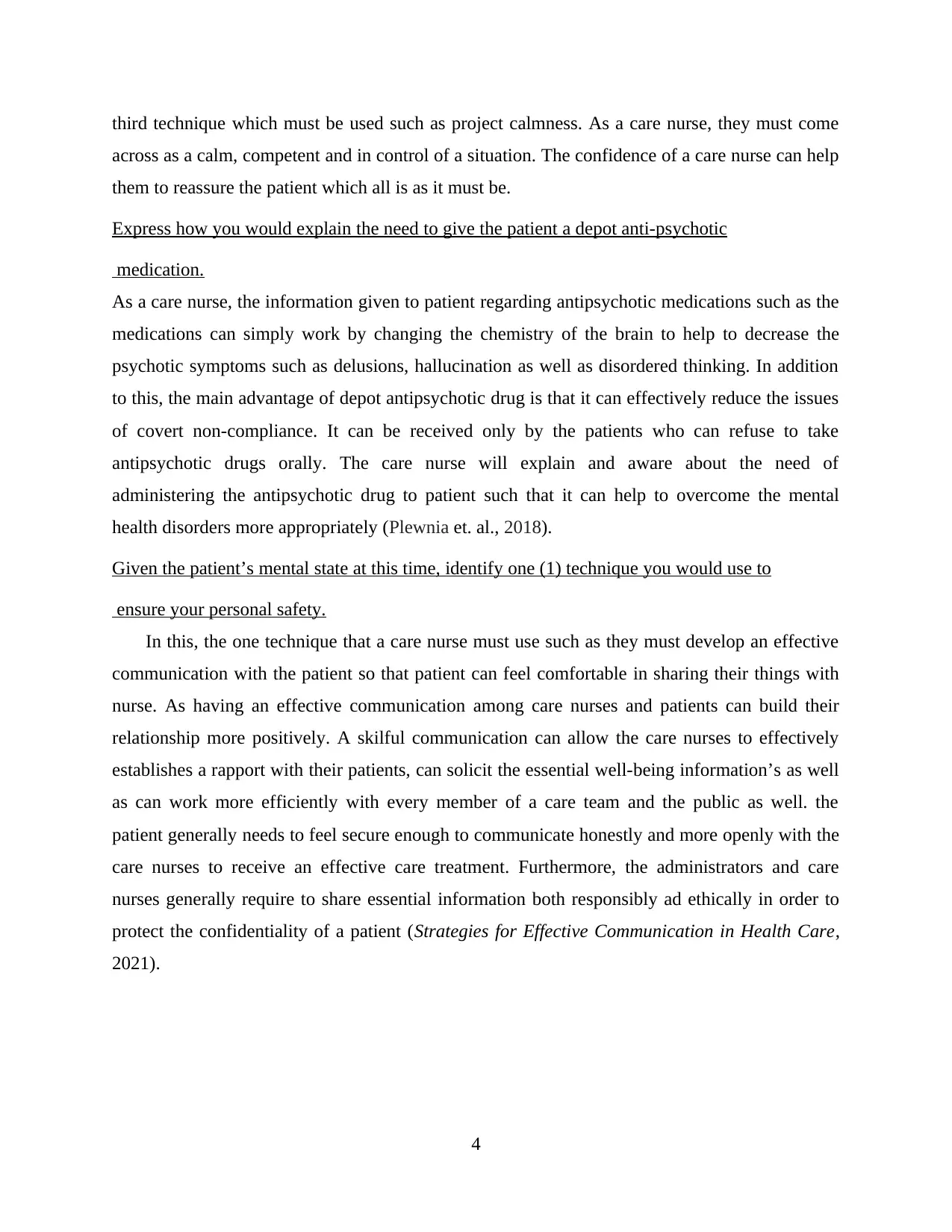
third technique which must be used such as project calmness. As a care nurse, they must come
across as a calm, competent and in control of a situation. The confidence of a care nurse can help
them to reassure the patient which all is as it must be.
Express how you would explain the need to give the patient a depot anti-psychotic
medication.
As a care nurse, the information given to patient regarding antipsychotic medications such as the
medications can simply work by changing the chemistry of the brain to help to decrease the
psychotic symptoms such as delusions, hallucination as well as disordered thinking. In addition
to this, the main advantage of depot antipsychotic drug is that it can effectively reduce the issues
of covert non-compliance. It can be received only by the patients who can refuse to take
antipsychotic drugs orally. The care nurse will explain and aware about the need of
administering the antipsychotic drug to patient such that it can help to overcome the mental
health disorders more appropriately (Plewnia et. al., 2018).
Given the patient’s mental state at this time, identify one (1) technique you would use to
ensure your personal safety.
In this, the one technique that a care nurse must use such as they must develop an effective
communication with the patient so that patient can feel comfortable in sharing their things with
nurse. As having an effective communication among care nurses and patients can build their
relationship more positively. A skilful communication can allow the care nurses to effectively
establishes a rapport with their patients, can solicit the essential well-being information’s as well
as can work more efficiently with every member of a care team and the public as well. the
patient generally needs to feel secure enough to communicate honestly and more openly with the
care nurses to receive an effective care treatment. Furthermore, the administrators and care
nurses generally require to share essential information both responsibly ad ethically in order to
protect the confidentiality of a patient (Strategies for Effective Communication in Health Care,
2021).
4
across as a calm, competent and in control of a situation. The confidence of a care nurse can help
them to reassure the patient which all is as it must be.
Express how you would explain the need to give the patient a depot anti-psychotic
medication.
As a care nurse, the information given to patient regarding antipsychotic medications such as the
medications can simply work by changing the chemistry of the brain to help to decrease the
psychotic symptoms such as delusions, hallucination as well as disordered thinking. In addition
to this, the main advantage of depot antipsychotic drug is that it can effectively reduce the issues
of covert non-compliance. It can be received only by the patients who can refuse to take
antipsychotic drugs orally. The care nurse will explain and aware about the need of
administering the antipsychotic drug to patient such that it can help to overcome the mental
health disorders more appropriately (Plewnia et. al., 2018).
Given the patient’s mental state at this time, identify one (1) technique you would use to
ensure your personal safety.
In this, the one technique that a care nurse must use such as they must develop an effective
communication with the patient so that patient can feel comfortable in sharing their things with
nurse. As having an effective communication among care nurses and patients can build their
relationship more positively. A skilful communication can allow the care nurses to effectively
establishes a rapport with their patients, can solicit the essential well-being information’s as well
as can work more efficiently with every member of a care team and the public as well. the
patient generally needs to feel secure enough to communicate honestly and more openly with the
care nurses to receive an effective care treatment. Furthermore, the administrators and care
nurses generally require to share essential information both responsibly ad ethically in order to
protect the confidentiality of a patient (Strategies for Effective Communication in Health Care,
2021).
4
⊘ This is a preview!⊘
Do you want full access?
Subscribe today to unlock all pages.

Trusted by 1+ million students worldwide
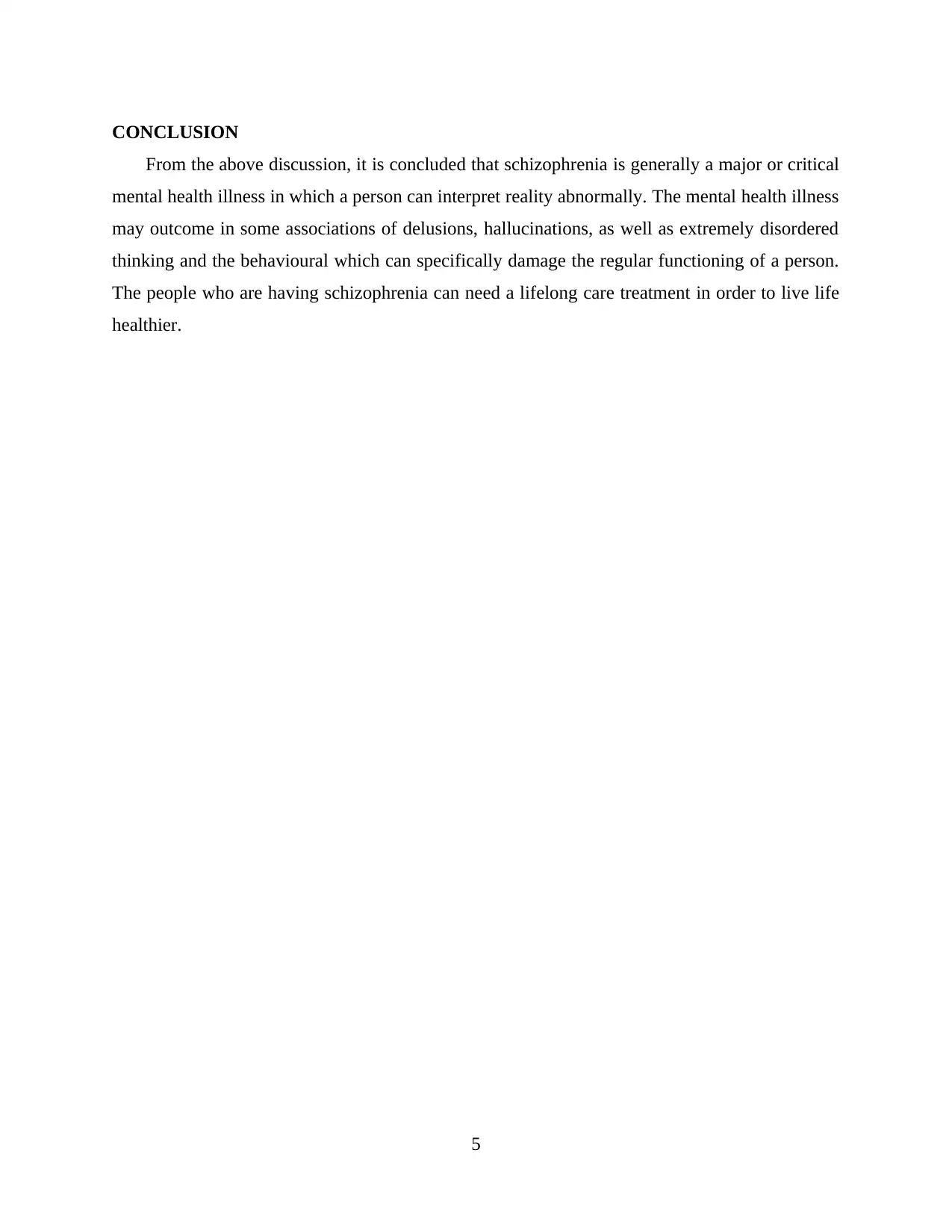
CONCLUSION
From the above discussion, it is concluded that schizophrenia is generally a major or critical
mental health illness in which a person can interpret reality abnormally. The mental health illness
may outcome in some associations of delusions, hallucinations, as well as extremely disordered
thinking and the behavioural which can specifically damage the regular functioning of a person.
The people who are having schizophrenia can need a lifelong care treatment in order to live life
healthier.
5
From the above discussion, it is concluded that schizophrenia is generally a major or critical
mental health illness in which a person can interpret reality abnormally. The mental health illness
may outcome in some associations of delusions, hallucinations, as well as extremely disordered
thinking and the behavioural which can specifically damage the regular functioning of a person.
The people who are having schizophrenia can need a lifelong care treatment in order to live life
healthier.
5
Paraphrase This Document
Need a fresh take? Get an instant paraphrase of this document with our AI Paraphraser
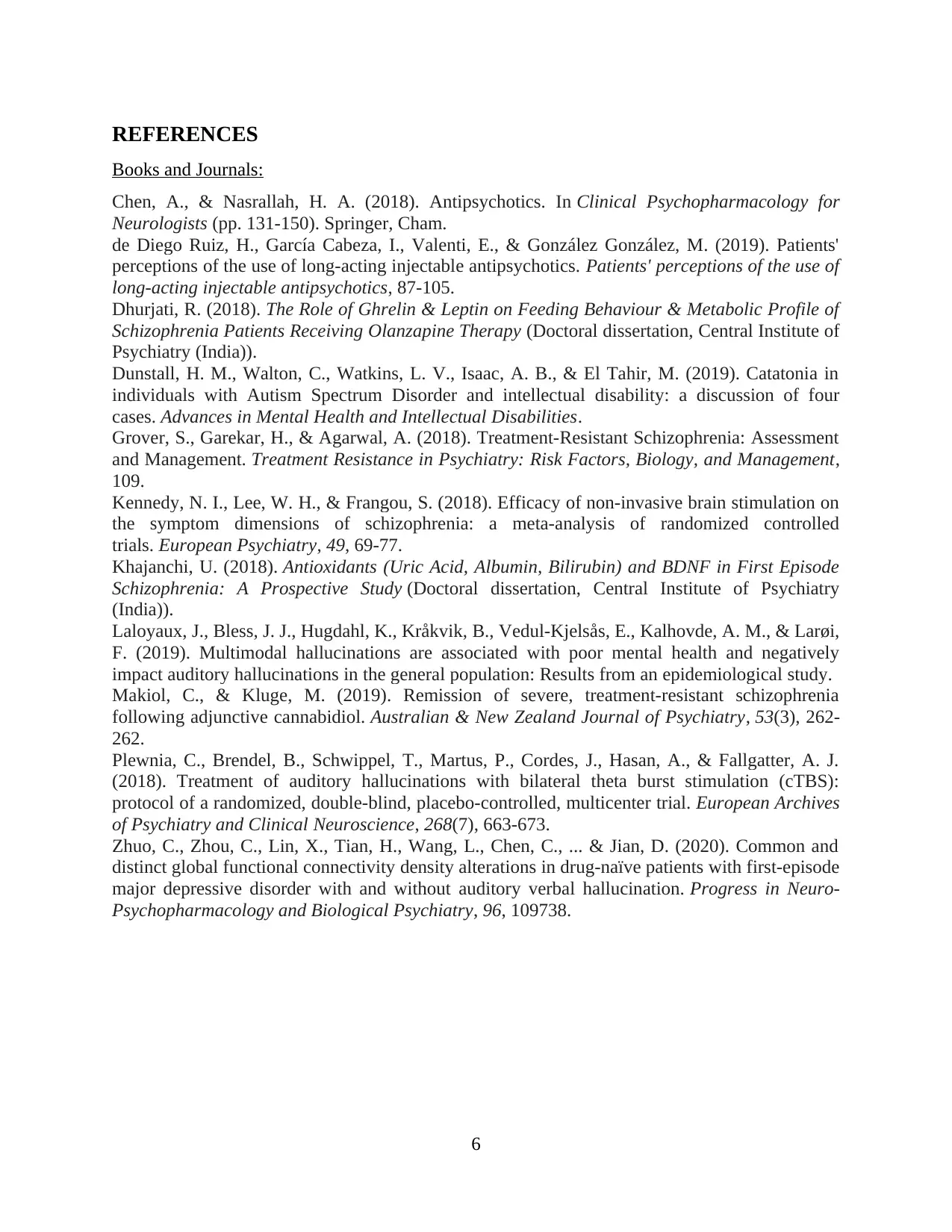
REFERENCES
Books and Journals:
Chen, A., & Nasrallah, H. A. (2018). Antipsychotics. In Clinical Psychopharmacology for
Neurologists (pp. 131-150). Springer, Cham.
de Diego Ruiz, H., García Cabeza, I., Valenti, E., & González González, M. (2019). Patients'
perceptions of the use of long-acting injectable antipsychotics. Patients' perceptions of the use of
long-acting injectable antipsychotics, 87-105.
Dhurjati, R. (2018). The Role of Ghrelin & Leptin on Feeding Behaviour & Metabolic Profile of
Schizophrenia Patients Receiving Olanzapine Therapy (Doctoral dissertation, Central Institute of
Psychiatry (India)).
Dunstall, H. M., Walton, C., Watkins, L. V., Isaac, A. B., & El Tahir, M. (2019). Catatonia in
individuals with Autism Spectrum Disorder and intellectual disability: a discussion of four
cases. Advances in Mental Health and Intellectual Disabilities.
Grover, S., Garekar, H., & Agarwal, A. (2018). Treatment-Resistant Schizophrenia: Assessment
and Management. Treatment Resistance in Psychiatry: Risk Factors, Biology, and Management,
109.
Kennedy, N. I., Lee, W. H., & Frangou, S. (2018). Efficacy of non-invasive brain stimulation on
the symptom dimensions of schizophrenia: a meta-analysis of randomized controlled
trials. European Psychiatry, 49, 69-77.
Khajanchi, U. (2018). Antioxidants (Uric Acid, Albumin, Bilirubin) and BDNF in First Episode
Schizophrenia: A Prospective Study (Doctoral dissertation, Central Institute of Psychiatry
(India)).
Laloyaux, J., Bless, J. J., Hugdahl, K., Kråkvik, B., Vedul-Kjelsås, E., Kalhovde, A. M., & Larøi,
F. (2019). Multimodal hallucinations are associated with poor mental health and negatively
impact auditory hallucinations in the general population: Results from an epidemiological study.
Makiol, C., & Kluge, M. (2019). Remission of severe, treatment-resistant schizophrenia
following adjunctive cannabidiol. Australian & New Zealand Journal of Psychiatry, 53(3), 262-
262.
Plewnia, C., Brendel, B., Schwippel, T., Martus, P., Cordes, J., Hasan, A., & Fallgatter, A. J.
(2018). Treatment of auditory hallucinations with bilateral theta burst stimulation (cTBS):
protocol of a randomized, double-blind, placebo-controlled, multicenter trial. European Archives
of Psychiatry and Clinical Neuroscience, 268(7), 663-673.
Zhuo, C., Zhou, C., Lin, X., Tian, H., Wang, L., Chen, C., ... & Jian, D. (2020). Common and
distinct global functional connectivity density alterations in drug-naïve patients with first-episode
major depressive disorder with and without auditory verbal hallucination. Progress in Neuro-
Psychopharmacology and Biological Psychiatry, 96, 109738.
6
Books and Journals:
Chen, A., & Nasrallah, H. A. (2018). Antipsychotics. In Clinical Psychopharmacology for
Neurologists (pp. 131-150). Springer, Cham.
de Diego Ruiz, H., García Cabeza, I., Valenti, E., & González González, M. (2019). Patients'
perceptions of the use of long-acting injectable antipsychotics. Patients' perceptions of the use of
long-acting injectable antipsychotics, 87-105.
Dhurjati, R. (2018). The Role of Ghrelin & Leptin on Feeding Behaviour & Metabolic Profile of
Schizophrenia Patients Receiving Olanzapine Therapy (Doctoral dissertation, Central Institute of
Psychiatry (India)).
Dunstall, H. M., Walton, C., Watkins, L. V., Isaac, A. B., & El Tahir, M. (2019). Catatonia in
individuals with Autism Spectrum Disorder and intellectual disability: a discussion of four
cases. Advances in Mental Health and Intellectual Disabilities.
Grover, S., Garekar, H., & Agarwal, A. (2018). Treatment-Resistant Schizophrenia: Assessment
and Management. Treatment Resistance in Psychiatry: Risk Factors, Biology, and Management,
109.
Kennedy, N. I., Lee, W. H., & Frangou, S. (2018). Efficacy of non-invasive brain stimulation on
the symptom dimensions of schizophrenia: a meta-analysis of randomized controlled
trials. European Psychiatry, 49, 69-77.
Khajanchi, U. (2018). Antioxidants (Uric Acid, Albumin, Bilirubin) and BDNF in First Episode
Schizophrenia: A Prospective Study (Doctoral dissertation, Central Institute of Psychiatry
(India)).
Laloyaux, J., Bless, J. J., Hugdahl, K., Kråkvik, B., Vedul-Kjelsås, E., Kalhovde, A. M., & Larøi,
F. (2019). Multimodal hallucinations are associated with poor mental health and negatively
impact auditory hallucinations in the general population: Results from an epidemiological study.
Makiol, C., & Kluge, M. (2019). Remission of severe, treatment-resistant schizophrenia
following adjunctive cannabidiol. Australian & New Zealand Journal of Psychiatry, 53(3), 262-
262.
Plewnia, C., Brendel, B., Schwippel, T., Martus, P., Cordes, J., Hasan, A., & Fallgatter, A. J.
(2018). Treatment of auditory hallucinations with bilateral theta burst stimulation (cTBS):
protocol of a randomized, double-blind, placebo-controlled, multicenter trial. European Archives
of Psychiatry and Clinical Neuroscience, 268(7), 663-673.
Zhuo, C., Zhou, C., Lin, X., Tian, H., Wang, L., Chen, C., ... & Jian, D. (2020). Common and
distinct global functional connectivity density alterations in drug-naïve patients with first-episode
major depressive disorder with and without auditory verbal hallucination. Progress in Neuro-
Psychopharmacology and Biological Psychiatry, 96, 109738.
6
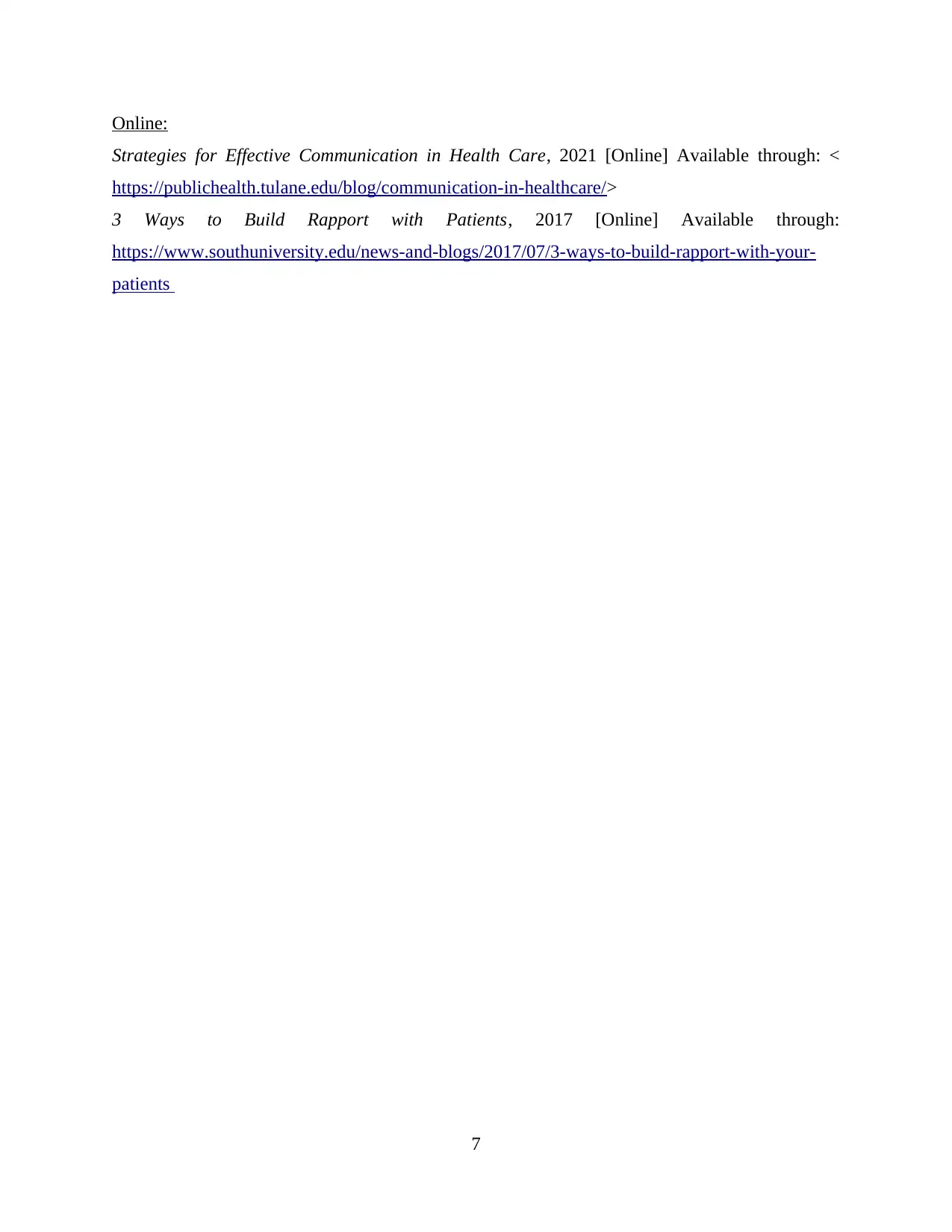
Online:
Strategies for Effective Communication in Health Care, 2021 [Online] Available through: <
https://publichealth.tulane.edu/blog/communication-in-healthcare/>
3 Ways to Build Rapport with Patients, 2017 [Online] Available through:
https://www.southuniversity.edu/news-and-blogs/2017/07/3-ways-to-build-rapport-with-your-
patients
7
Strategies for Effective Communication in Health Care, 2021 [Online] Available through: <
https://publichealth.tulane.edu/blog/communication-in-healthcare/>
3 Ways to Build Rapport with Patients, 2017 [Online] Available through:
https://www.southuniversity.edu/news-and-blogs/2017/07/3-ways-to-build-rapport-with-your-
patients
7
⊘ This is a preview!⊘
Do you want full access?
Subscribe today to unlock all pages.

Trusted by 1+ million students worldwide
1 out of 9
Related Documents
Your All-in-One AI-Powered Toolkit for Academic Success.
+13062052269
info@desklib.com
Available 24*7 on WhatsApp / Email
![[object Object]](/_next/static/media/star-bottom.7253800d.svg)
Unlock your academic potential
Copyright © 2020–2026 A2Z Services. All Rights Reserved. Developed and managed by ZUCOL.





